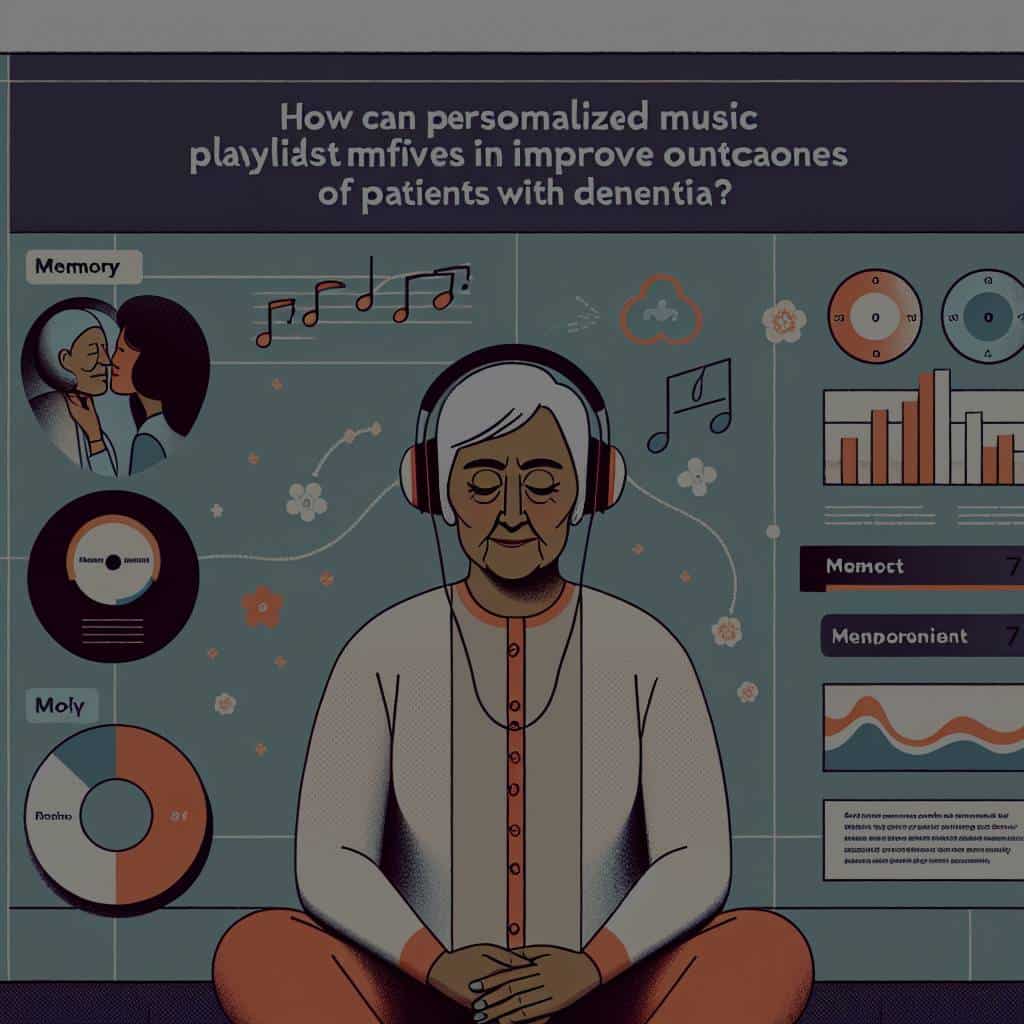How Can Personalized Music Playlists Improve Outcomes in Patients with Dementia?

As dementia grapples with the minds of millions worldwide, caregivers, families, and healthcare professionals are constantly seeking effective interventions to improve the quality of life for these individuals. Among numerous therapies, music has emerged as a promising tool in managing some of the challenging aspects of dementia such as mood fluctuations and memory loss. Research studies notably available on PubMed, underscore the potential role of personalized music playlists in enhancing the well-being of dementia patients. For those of you who may not be familiar with PubMed, it is a free search engine maintained by the U.S. National Library of Medicine, and it contains millions of citations and abstracts of biomedical literature. In this article, we delve into the evidence-based benefits of music therapy, particularly personalized playlists, for people with dementia.
Unraveling the Connection Between Music, Dementia, and Mood
Music and mood have a profound connection. Whether it’s a melancholic ballad that brings a tear to your eye or an upbeat track that gets your foot tapping, music has an undeniable power to evoke emotions and memories. This association can be particularly beneficial for individuals with dementia.
Also read : What Are the Protective Health Effects of Green Tea Consumption?
A quick search on Google or PubMed can lead you to numerous studies indicating the positive effects of music on mood in dementia patients. Research has shown that listening to personalized music playlists can significantly improve mood and reduce agitation among individuals with Alzheimer’s disease and other forms of dementia. This intervention helps not only the patients but also their carers, who often grapple with the stressful issue of managing mood swings and aggression.
The Role of Personalized Music in Enhancing Quality of Life
When it comes to dementia care, improving the patient’s quality of life is paramount. Personalized music playlists cater to the individual’s musical preferences, tapping into their past and providing a sense of comfort and familiarity.
Have you seen this : Can Community-Based Interventions Reduce Health Disparities in Underserved Areas?
By tailoring the music to the patient’s personal history and preferences, caregivers can foster an emotional connection, often triggering memories associated with the songs. The therapeutic potential of this approach was highlighted in a study published on PubMed, which found that personalized music intervention significantly improved the quality of life for people living with dementia.
The Science Behind Music as a Therapeutic Intervention
Music’s magical effect on our brains is well-documented in scientific literature. The relationship between music and dementia is a topic of extensive research, with numerous studies examining how music interventions can influence various aspects of cognition and behavior in dementia patients.
Music, particularly familiar tunes, can stimulate brain areas responsible for memory. In people with Alzheimer’s disease, the part of the brain linked to musical memory often remains undamaged for a long time. Thus, hearing familiar music can trigger past memories and emotions, offering a way for these individuals to reconnect with the world around them.
The Impact of Personalized Music on Carers
As much as dementia affects the individuals diagnosed, it also significantly impacts their carers. Dealing with the behavioral and psychological symptoms of dementia can be quite challenging.
Implementing personalized music in the care routine can prove beneficial not only for the patients but also for their caregivers. A study on PubMed revealed that the use of personalized music playlists reduced caregiver stress by mitigating behavioral issues in dementia patients. By positively impacting the patients’ mood and behavior, music can provide a reprieve for the caregivers and contribute to a more harmonious care environment.
Personalized Music: A Tool for Improved Dementia Care
In the face of the growing dementia crisis, it’s crucial to explore all potential strategies to improve patient outcomes and make the caregiving journey a bit more manageable. Personalized music playlists represent an innovative and evidence-based tool that can help accomplish these goals.
As you dive into the world of dementia care, remember that every person’s experience with dementia is unique, and what works for one person may not work for another. However, the beauty of a personalized music playlist is its flexibility – the ability to adapt to each individual’s musical preference and memory.
The power of music in dementia care is immense, and its potential remains largely untapped. Whether through a simple Google search or a more scholarly study on PubMed, the evidence for music as a therapeutic intervention for dementia is compelling. As we continue to face the challenge of dementia, let music play its part, providing comfort, sparking memories, and improving the quality of life for those affected.
Incorporating Personalized Music into Dementia Care Plans
Incorporating personalized music into care plans for individuals living with dementia is a practical and beneficial approach. Given the significant impact of music on mood and memory, it can serve as a powerful tool in managing the symptoms of dementia.
The process of creating personalized playlists involves acquainting oneself with the patient’s musical preferences. Caregivers and family members can collaborate to compile a list of songs that the patient enjoyed in their younger years, or tracks that are associated with significant memories. Accessible platforms such as Spotify and Apple Music can be used to create and curate these playlists.
In settings such as nursing homes and long-term care homes, music intervention has proved to be a successful approach. Google Scholar and PubMed offer numerous articles that delve into the topic of music therapy in dementia care. For instance, a study conducted by the College of Medicine at Penn State University revealed a noticeable reduction in anxiety and improvement in mood among dementia patients after consistent music listening sessions.
However, it’s not just the individuals with dementia who benefit from these sessions. The study also highlighted the positive effects on caregivers, reporting a decrease in stress and burden. This is a significant finding, considering that caregiver burnout is a prevalent issue in dementia care.
Personalized music therapy is an optimal approach in managing dementia as it is non-invasive, cost-effective, and can be tailored to each individual’s preferences and needs.
Conclusion: The Power of Personalized Music in Dementia Care
Understanding the role and potential of personalized music in dementia care is crucial given the increasing global prevalence of dementia. It is a simple yet impactful approach that can significantly enhance the quality of life of those living with dementia.
In conclusion, personalized music playlists not only provide comfort and evoke memories, but they also offer a sense of identity to people with Alzheimer’s disease and other forms of dementia. They reduce anxiety and agitation, contribute to mood stability, and stimulate cognitive function.
As we continue to navigate the challenging landscape of dementia care, we need to incorporate and emphasize more such innovative and evidence-based interventions. The existing research on PubMed and Google Scholar, as well as practical experiences from caregivers around the world, underscore the therapeutic potential of personalized music.
While no single intervention can alleviate all the challenges associated with dementia care, personalized music playlists offer a promising tool that can lead to improved outcomes. As we seek to enhance the quality of life for individuals living with dementia, let’s remember the power of music and its potential to bring comfort, happiness, and a sense of self. Let’s allow music to play its part in our collective effort to make the journey of dementia a bit more manageable, one note at a time.
